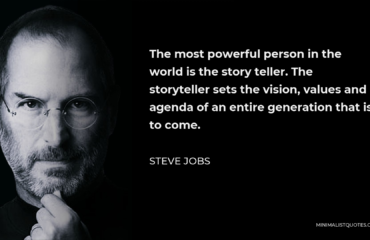
We all would have worked with different kinds of leaders…with people who are analytical…with people who are indecisive…with people who keep on upward delegating… with people who try to build consensuses…with people who are extremely authoritative…with people who micromanage…with people who develop their teams …with people who are extremely aggressive with targets…and so on and so forth.
During our careers we would have seen our peers, seniors and juniors take different career growth paths. We would have seen people who gallop through the lower and middle ranks and reach leadership roles at a very young age. But then struggle once they reach these leadership roles. Others who move up slowly up the ranks but blossom into great leaders once they reach leadership positions and some others who just keep going from strength to strength…
We have also seen during our lives and careers leaders, peers, and sub ordinates with whom we feel a very close connect and whom we feel have influenced and brought out the best in us.
Organizations map key competencies for various roles all of which can be categorized into the following ones
1. Technical skills like accounting, sales, coding, business planning etc.
2. Cognitive abilities like analytical reasoning, big picture thinking and long-term vision
3. Emotional intelligence
4. Intellect
Emotional Intelligence is born largely in the neurotransmitters of the brains of the limbic system. The limbic system governs feelings, impulses, and drives. It is also a very well-known and accepted fact that emotional intelligence increases with age.
Why does this happen? It’s because a person picks up more experiences during his life which help him to understand and evolve on this front. For a very long time it was believed that only genes that influence emotional intelligence.
But it is very clearly accepted now that emotional intelligence can be learnt.
Let’s now understand the various components that influence Emotional Intelligence which would also be the steps that we would need to learn to develop our emotional intelligence.
- Self-awareness
Self-awareness means having a deep understanding of one’s emotions, strengths, weakness, needs and drives. People with strong self-awareness are neither overly critical, nor unrealistically hopeful. Self-awareness recognize how their feelings affect them, other people, and their job performance. So, if I am self-aware that working under very tight deadlines brings the worst output from me, I will have to plan to start and complete the work well in advance to ensure that I do a good job of whatever I have been assigned to do.
Am sure as we observe ourselves, we can make out when we are getting irritated with a response, or a presentation and the way respond to various such stimuli what is making us feel happy and how is it that we respond when we feel happy about something.
So how does a normal person understand whether he or she is self-aware or not?
- Able to access self and situations more realistically
- Because the person is more aware about the situation that he is often able to speak more openly and accurately about the situation in hand
- Because they are aware and speak more openly, they come across as confident
- They take calculated risks after accessing the entire situation
- Will try to avoid or take help of others for areas where they are weak or lack expertise
Self-awareness also makes it easier for someone to regulate and control their emotions. Our emotions are driven by biological impulses and there is no way that we do away with them. The only think that we can do is to manage them and use these emotions for getting a positive output.
Please refer my article published on 10th December 21 the link to which is as shown below
Key Routines from sports leaders for success in every day life – Rejo Francis
(1) Key Routines from sports leaders for success in every day life | LinkedIn
In the article I talk about how various sportspersons use these kinds of emotions to improve their performances. It’s not that any high performer whether it’s in sports or business doesn’t get emotional or feel bad moods it’s just that they are able to regulate the same on a greater number of occasions.
Why is self-regulation critical?
1. This creates an environment of trust and fairness. When the leader adopts this approach, it has a trickle-down effect on the team over a longer period
2. Today’s business scenario is rife with ambiguity and change where companies merge and fall apart. Technology changes happen at a dizzying pace the ability to regulate emotions and take the best and right decisions based on business logic paves the way for more success in such competitive scenarios.
But in normal day to day life, we often glorify people with fiery temperament and their outbursts and fiery temperament and looked upon as passion and are considered as hall marks of power and charisma. So don’t be disappointed if in the short term if people call you as a good human being or as being too cold the business results over time will reinforce the success of your actions.
- Motivation and Drive to achieve beyond expectations
Am sure there wouldn’t be anyone who isn’t motivated by a big salary or an impressive title but people with high EI stand out by their passion for work itself. The key characteristics which can help identify such people are their passion to seek our creative challenges, their love to learn new things, and to continuously improve themselves and the huge pride that they take in doing a job well. You will also find it very tough to keep pace with their energy, their persistence to get things done. Very often people with high motivation and drive challenge and improve the status quo. Because of their drive to achieve they also devise various methods to track progress of each of the activities which also leads to high performance achievements. Like in the earlier case when the leader starts tracking a particular parameter automatically the team also follows suite.
4. Empathy
In normal day to day business situations, it is rare that we have heard of people being praised let alone be rewarded for their empathy. The very word looks out of place for the harsh business situations of everyday life. For the sake of clarity empathy doesn’t mean adopting other people’s emotions as one’s own and trying to please everyone. That would make taking actions almost impossible. Empathy in this situation only means considering employee feelings along with other factors in the process of making intelligent decisions.
Empathy has gained considerable importance in our day to day working in recent times mainly because of the below reasons
- The increasing usage of multilocation and even multicultural teams
- The rapid pace of globalization
- The need to retain good talent
- The increasing usage of remote working after the onset of the pandemic
- A very diverse work force with people coming from all parts of the country both urban and rural all of whom have different sets of emotions and priorities
I remember how the senior management team went about creating the team when we were part of a new Joint venture which was formed almost a decade back. The two companies which were becoming part of the JV in the above case had very different cultures and processes and practices and the leadership team was very empathetic while going about creating and taking the best business decisions for the success of the joint venture. I also remember how the leadership team had kept very structured monthly reviews which was not only to understand the evolving business situation but also to understand the underlying emotions of each member of the team which had been created by merging the manpower of the two companies.
We have also seen very often how very average or at times below par players in sports end up becoming great coaches. One of the reasons for the same is that coaches or mentors get inside the heads of the people whom they are helping. They can sense when and how to give effective feedback, when to push for better performance and when to hold back and empathize with the person who is being supported and so on.
5. Social Skills
This is probably the most talked about and everyone’s favorite when analyzing if someone has emotional intelligence. But like all other skills the social skills that are needed for emotional intelligence in business are very different from just social skills that we often think about.
In the case of social skills from an EI perspective it’s about the ability to build friendliness with a purpose, the capability of moving in the direction that you desire whether its agreement on a new marketing plan or closing a tough negotiation with an important client.
We very often come across lot of people who have amazing networking skills and build friends wherever they go but these very people would struggle to use this relationship or to move them in the desired business direction that they want to. So, the above social skills are not what helps us in building EI…
Simply put great social skills are what enables people to put their EI to work to build and sustain great teams.
So, while self-awareness and self-regulation are skills required for EI which are totally inward looking the last two empathy and social skills are outward looking and it is the combination of these factors which helps us to learn and grow our Emotional Intelligence…
All the best to everyone in their journey of learning and growing their Emotional Intelligence and keep watching this space for more…



